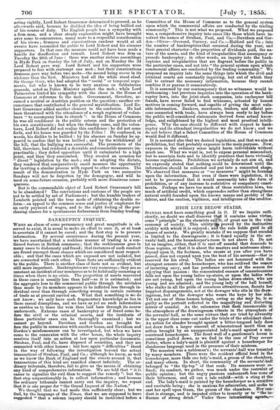BANKRUPTCY INQUIRY.
WHEN an abuse of some permanency and great magnitude is ob- served to exist, it is usual to make an effort to cure it, or at least to ascertain if it cannot be cured; and the first step is to procure information. By several occurrences during the present year, we have ascertained that a reckless manner of trading is a con- tinued feature in British commerce; that the recklessness goes in many cases to dishonesty and fraud; that instances of such conduct are found amongst those classes which are considered most respect- able ; and that the cases which are exposed are not isolated, but are connected with each other. These facts are sufficiently evident to the public. There is another class of facts not so evident, but still more important. Bankruptcies are very numerous ; they are so constant an incident of our commerce as to be habitually occurring at times when there is no crisis. The proportion of assets recovered in these cases is usually less than half—so it is estimated; and the aggregate loss to the commercial public through the mistakes thus made by its members appears to be inflicted less through in- dividual error than through something wrong in certain customs of trade as at present carried on. What that something is we do not know ; we only have such fragmentary knowledge as lies in these casual disruptions, and we have as yet no such information as enables us to trace the vein thus laid bare through its course underneath. Extreme eases of bankruptcy or of fraud come be- fore the civil or the criminal courts, and the incidents of these particular cases can be thoroughly examined ; but we cannot go beyond. Davidson and Gordon are brought be- fore the public in connexion with another house, and Davidson and Gordon's misdemeanour can be investigated, but when we have come to the connexion with the other house, the whole inquiry resolves itself into an action at law upon particular documents. Strahan, Paul, and Co. have disposed of securities, and they are oonneeted with other houses : but here again" difficulties" stand in the way of following the investigation beyond the actual transactions of Strahan, Paul, and Co.; although we know, as well as we know the Bank of England and the streets around it, that transactions of this kind are ramified almost infinitely. The or- dinary tribunals, therefore, fail to give us the means of obtaining any kind of comprehensive information. We are told that "it is easier to signalize the evil than to suggest the remedy ": but the first step unquestionably is, to collect information ; and because the ordinary tribunals cannot carry out the inquiry, we repeat that it is one proper for "the Grand Inquest of the Nation."
We thought that we had made this sufficiently clear; but we find, by the language of the 7Vmes, that we are supposed to have suggested "that a solemn inquiry should be instituted before a
Committee of the House of Commons as to the general system upon which the commercial affairs are conducted by the trading community." This is not what we proposed. What we proposed was, a comprehensive inquiry into cases like those which have in- volved the names of Strahan, Paul, and Co.—Davidson and Gor- don—Oliver—Overend, Gurney, and Co.—Halford and Co.; into the number of bankruptcies that occurred during the year, and their general character—the proportion of dividends paid, the na- ture of the assets, and the kind of irregularities that a000mpany or precede bankruptcy ; in other words, an inquiry into the bank- ruptcies and irregularities that are flagrant before the public in the particular cases, and not into "the general system upon which commercial affairs are conducted by the trading community?" We proposed an inquiry into the same things into which the civil and criminal courts are constantly inquiring, but out of which they fail to extract the necessary information, because they cannot combine it or pursue it consecutively.
It is assumed by our contemporary that no witnesses would be forthcoming : but previous inquiries into the operation of the bank- ruptcy laws, into the joint-stook companies, into exchequer bill frauds, have never failed to find witnesses, actuated by honest motives in coming forward, and capable of giving the most valu- able information. Bankers, merchants, traders, and official per- sons connected with trade have always been ready to lay before the public well-considered statements derived from actual. know- ledge, and enlightened by the highest and most practical intelli- gence. Why the ease should be different with respect to bank- ruptcy and its attendant irregularities we do not know ; and we do not believe that a Select Committee of the Howie of Commons would find it different.
It is assumed also that we desired legislation, and that we aim at prohibition, but that probably exposure is the main purpose. Now, exposure in the ordinary sense might harm individuals without much use. What we want is not to expose personal misconduct, but to ascertain facts and to identify practices that have virtually become regulations. Prohibition we certainly do not aim at, and we expressly stated that nothing could be aetermined until the information should be collected and put into a connected shape. We observed that measures or "no measures" might be foundid upon the information. But even if there were legislation, it is not to be presumed that it would necessarily take the form of prohibition, or of any increase to restrictive or compulsory enact- ments. Perhaps we have too much of these restrictive laws, too much of artificial credit, which supersedes rather than strengthens natural credit founded upon the known means and probity of the debtor, and the caution, vigilance, and intelligence of the creditor.


























 Previous page
Previous page